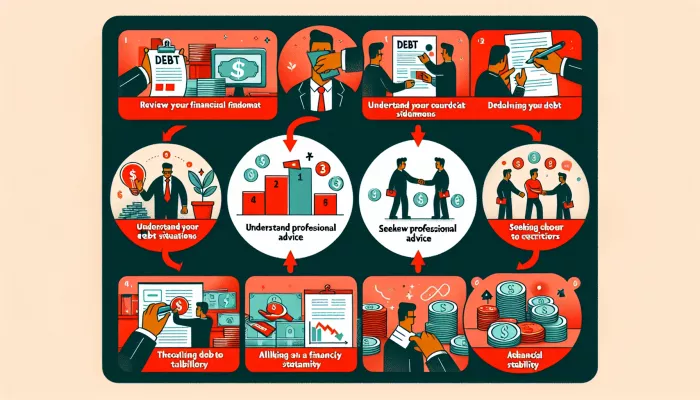

To the understand your debts Before you start any negotiation, you put yourself in a position of power.
Detailed knowledge about what you owe, who you owe it to, and the conditions associated with it is crucial. Here’s how you can start understanding your debts in depth.
First, gather all your account statements and debt documents.
This includes credit cards, loans, mortgages, and any other financial obligations. Examine them carefully to identify:
Your credit report is a valuable source of information. It not only shows your current debts, but also how you have managed your payments so far.
Obtaining a copy of your credit report may reveal debts you had forgotten about or were unaware of.
You can request a free report once a year from sites like Serasa.
Reflect on how you accumulated this debt is also essential. Identify the expenses that contributed to your current situation and consider which of them could have been avoided.
This analysis can help you avoid future unnecessary debt.
Some debts, such as those with higher interest rates or more significant total value, need to be prioritized.
Identify which debts are costing you the most and consider paying those off first. This could include credit cards and high-interest personal loans.
If you feel that the situation is beyond your ability to handle, do not hesitate to seek professional help.
Personal finance experts or debt counselors can offer insights and strategies to better manage your finances.
Remember, understanding your debts is the crucial first step to effectively negotiating them. With knowledge and planning, you can move toward a healthier financial situation.
When it comes to negotiate debts, understanding your options can make a big difference.
Below, you’ll find effective strategies that can help make this task easier, potentially saving you money and reducing financial stress.
Don't wait for a collection situation to start the conversation. Be proactive and contact creditors as soon as you foresee financial difficulties.
Expressing your willingness to pay and discussing your situation can open doors to flexible solutions.
Part lower interest rates, extended payment terms or even that part of the debt is forgiven.
Remember that receiving a smaller or slower payment is usually more advantageous to creditors than receiving nothing at all.
If you are dealing with multiple debts, debt consolidation can be a strategic option. This involves taking out a new loan to pay off multiple debts, potentially reducing your overall interest rates and making it easier to manage unified payments.
If you are in a situation of default, consider negotiating a settlement agreement that allows you to pay less than the total amount due.
Be aware that this approach may affect your credit score, but it may be a viable short-term solution.
If you feel overwhelmed, credit counseling services can offer guidance.
These services can help you understand your options, create a payment plan, and in some cases, negotiate with creditors on your behalf.
Regardless of the strategy chosen, it is crucial document all communications and agreements. Keep records of emails, letters, and call logs, as well as copies of any written agreements.
With the right knowledge and strategy, negotiating your debts can become a more manageable and less stressful journey, moving you toward a more stable financial future.
Avoid new debts is a fundamental part of financial health. Implementing proactive strategies is essential to keeping your finances under control.
Below, we detail effective ways to help you stay out of future debt.
One personal budget Clear is the first step to avoid new debts. Identify all your income, fixed and variable expenses.
Use budget apps to help with this control, ensuring that you don't spend more than you earn.
Create one emergency fund is crucial. This fund can cover unexpected expenses without having to resort to loans or credit cards.
Start with a small goal and gradually increase it.
Small savings can add up. Evaluate your daily habits and see where you can reduce costs.
Simple things like making coffee at home instead of buying it ready-made can make a big difference in the long run.
Tools online and financial applications can help you monitor your spending and save money.
Use these features to set savings goals, track spending, and identify where you can cut costs.
To start applying these strategies in your life, here are some helpful resources:
Investing in your financial education can have a great return.
Reading books, attending workshops, and consulting financial blogs can provide you with the knowledge you need to make wiser financial decisions and avoid unnecessary debt.
Remember, avoiding debt isn't just about cutting expenses, it's about creating a financial plan that aligns with your long-term goals and lifestyle.
Proactively implementing these practices can help ensure a healthy, debt-free financial life.